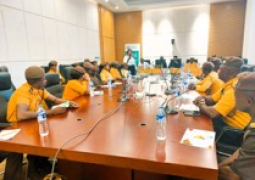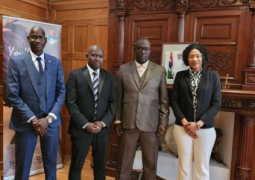
The contracts were awarded to local Gambian contractors for the construction of community pastures, rehabilitation of DLS LAB Abuko, construction of veterinary drug outlets, construction of fattening and breeding schemes, and mini dairy, milk collection centres, slaughterhouses, meat stalls, and construction of farmer demonstration in YBK to Taba Nisita, JKF, Competence Company Limited, and Gambia Procurement Services (G.P.S) respectively.
Mamud Njie, SRPEP project director, elaborated that this would enable the project to fulfill its objective of improving the livelihood of livestock farmers, strengthening the production and productivity and resilience of rural communities, and stimulating business entrepreneurship in the livestock sector.
He reminded the contractors that the 10% performance guarantee is to ensure that the project gets completed.
Mr. Njie emphasised that the contracts must be delivered on time per the specification while further warning the contractors that substandard work would not be accepted from any contractor.
“You were selected based on being the best out of the lot, hence, nothing but the best will be accepted,” he said.
The project director unveiled that these are contracts that are earmarked for 12 months while urging the contractors to work accordingly and deliver on time.
Deputy Permanent Secretary Madam Fatou Jammeh Touray on behalf of the Permanent Secretary MoA stressed that the Ministry has bemoaned incomplete work over the years.
She further appealed to the contractors that they are citizens of this country and they should all look forward to moving the country from where it is to another level.
“No single individual can do that unless we collectively come together to work together to ensure that we succeed as a country,” she said.
She added: “This Ministry cannot succeed in the absence of contractors while the contractors cannot also do without our contracts. Gone should be those days when we take government contracts lightly”.
Sarjo Marenah, representative of the Central Project Coordinating Unit (CPCU) emphasised that it is no longer business as usual while stressing that they want to empower Gambian local contractors but they too should deliver as expected in order to be considered.
“From the start, if we notice that you are not performing then you will be out because we would not be compromising and you contractors should consider these contracts as a test of challenge,” he said.




